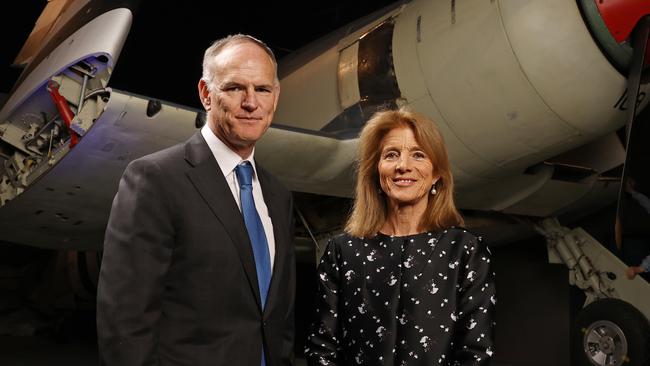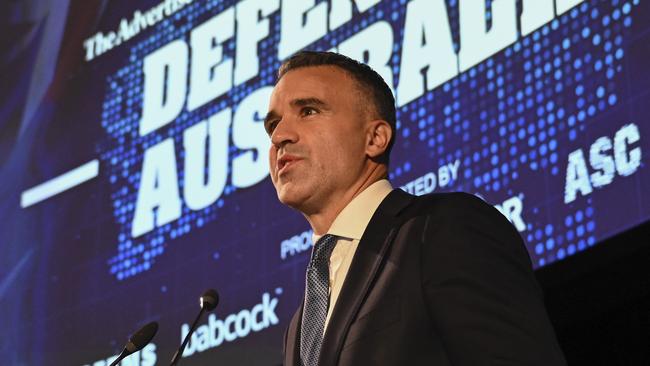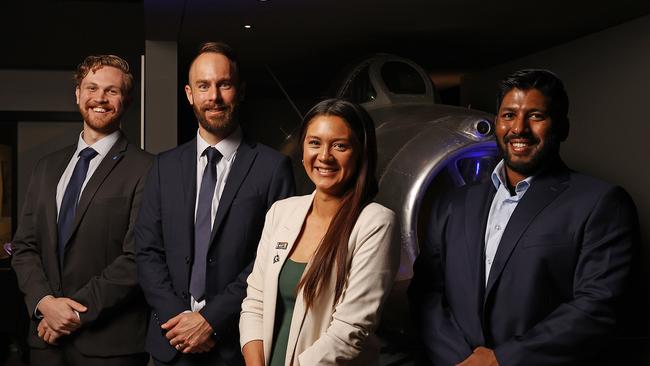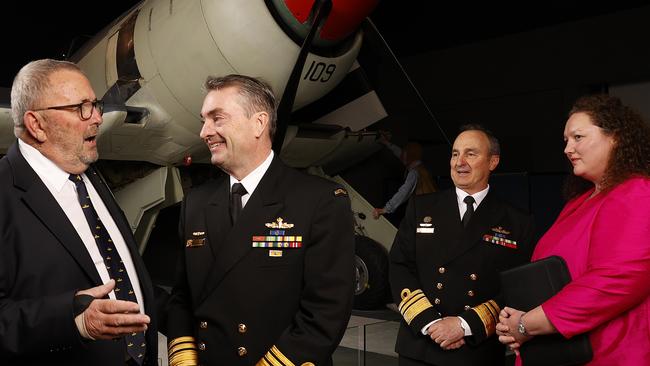SA ‘stepping up’ our national defence mission, says Premier Peter Malinauskas
Building the most complex military machines on the planet is no easy task but SA is up to the challenge, according to Premier Peter Malinauskas.
SA News
Don't miss out on the headlines from SA News. Followed categories will be added to My News.
Just as US President John F. Kennedy dared to send men to the moon, Australia is embarking on a national endeavour centred on Adelaide – building nuclear-powered submarines.
And, with JFK’s daughter and US ambassador Caroline Kennedy front and centre, The Advertiser on Monday night galvanised a star-studded cast of military, political and industry leaders at the heart of national power in Canberra.
The Defending Australia dinner at the Australian War Memorial attracted speakers including Defence Minister and Deputy Prime Minister Richard Marles, Opposition Leader Peter Dutton, Navy Nuclear Powered Submarine Task Force chief Vice-Admiral Jonathan Mead and Premier Peter Malinauskas.

Almost 100 people gathered in the Aircraft Hall, which houses classic aircraft including a Mustang, Zero, Sea Fury and MiG-15. It also showcases an exhibition, Air Power in the Pacific 1941-53.
Once again, the Pacific region is at the epicentre of global tension, because China’s military build-up has been labelled by Mr Marles as the biggest conventional escalation since World War II.
The dinner firmly placed on the agenda the unprecedented opportunities for new jobs, industry, manufacturing and prosperity that can flow from the AUKUS security pact – particularly the $368bn project to build at least eight nuclear-powered submarines in Adelaide.
The event was an unprecedented opportunity for Mr Malinauskas to press South Australia’s case – in his words – about “why defence industry matters to economic policy more broadly, beyond just the first and foremost need of investing in our national security”.
Mr Malinauskas highlighted the national mission of preserving the rules-based global order, which he said remained the best hope for a peaceful and prosperous future.
“And this is a national endeavour. This is not just about expecting the Commonwealth to provide – state governments have to step up, as well,” he said.
“SA is the defence state – we always have been, and we always will be. It is an honour and a responsibility that we do not take lightly, and we are already stepping up.”
But building the most complex military machines on the planet is no easy task. In particular, there is an immense challenge to produce sufficiently large numbers of the highly qualified workers needed for this national mission.

This task is the biggest risk facing the nuclear-powered submarine project, Mr Malinauskas has repeatedly declared.
This view intensified after he visited the UK’s submarine-construction facility at Barrow-in-Furness, on March 16, where he was stunned by the “overwhelming size and scale” of the AUKUS partner’s shipyard.
At the Australian War Memorial dinner, Mr Malinauskas pitched his speech to a national audience, aiming to prod other states into meeting the skills challenge, by outlining the economic and national security benefits.
“We are putting this in place now because this is a multi-generational project for our state,” he said.
“The people who will some day work on the AUKUS submarines may only be in primary school now, but by creating this pathway to skilled, high-paid jobs in these vital industries, we can create lives and careers of value that each make a vital contribution to our nation’s security.”
There is, as Mr Marles has highlighted, a need for “a controlled sense of urgency”, to get moving on this mission.
China had sought to “shape the world around it in a way it has not done before” in the past decade, he told the dinner, “accompanied by the biggest conventional military build-up we have seen by any country since the end of World War II”.
The AUKUS security pact’s response creates unprecedented economic opportunity for Adelaide, where vast infrastructure will be required at Osborne Naval Shipyard, on the Port River.
Expect to hear many more British accents around Adelaide in coming years – the AUKUS submarine to be built at Osborne will be a joint production between the UK and Australia, jam-packed with US technology.
It is likely the UK design – already being worked on – will be derived from the 152.9m Dreadnought ballistic missile submarine now under construction at Barrow-in-Furness.
The nuclear missile chambers in the boat’s centre would be removed and the design shortened – the joint Australian-UK submarine will be nuclear-powered but not nuclear-armed.
Given BAE Systems Australia’s parent company operates the Barrow-in-Furness shipyard, it is likely BAE will have a significant role in the Adelaide design and construction. It is contracted to build nine frigates at Osborne in a $45bn program, although doubt has been cast over its future by a naval surface ship review.
The other significant existing player at Osborne, ASC (formerly the Australian Submarine Corporation), also is likely to play a key role in the AUKUS submarine construction.
The federal government-owned firm built six conventionally powered Collins-class submarines at Osborne under a $5bn contract inked in 1987 – at the time the nation’s biggest defence deal.

ASC began a major sustainment program for the Collins-class boats after the sixth, HMAS Rankin, was commissioned in 2003. After a significant overhaul a decade ago, this program is now modelled on principles drawn from the car industry.
A key AUKUS objective is to modernise production processes to increase capacity and improve interoperability between the three nations.
There is a pressing need, however, for the three nations to be more transparent about the on-ground schedule ahead at Osborne, even if this is understandably process-driven for some time.

There remains doubt in some quarters about the AUKUS submarine program and whether the benefits will be realised in Adelaide, in particular. This is a legacy of major economic projects, including the Attack-class submarine and BHP Olympic Dam mine expansion, that have been hyped and then dashed.
But it is vital to understand that the AUKUS submarine is a tripartite national mission – not an Australian deal with a major defence contractor.
There is bipartisan political will across the three countries for the venture to succeed. Prime defence companies want to work in partnership with them, to create a continuous naval shipbuilding program in Adelaide using a collaborative stewardship model.
A vast challenge lies ahead on this national mission. But the benefits for the state, and Australia as a whole, are huge and significant if this challenge can be met.





